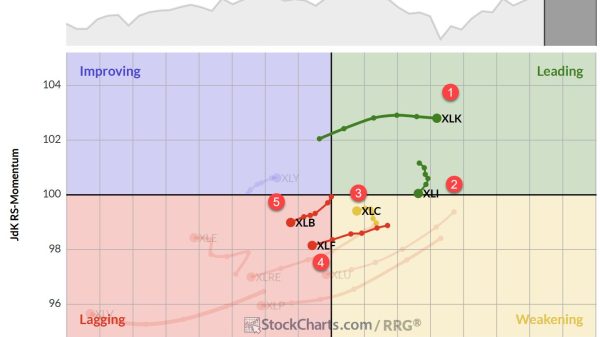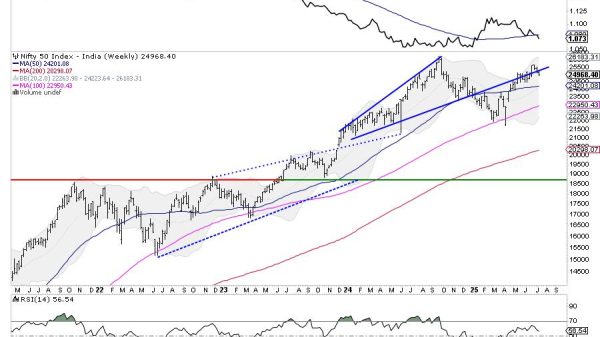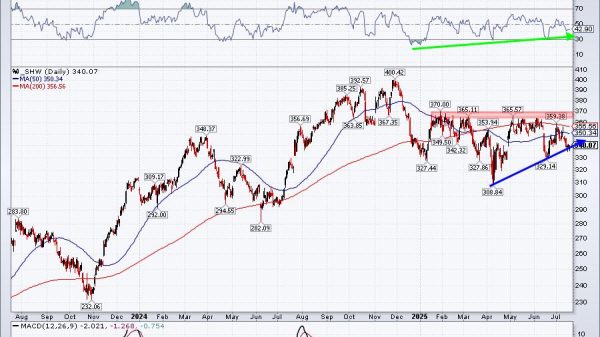Meta Stock Tumbles 15.3% on Weak Q2 Revenue Forecast
Quick Look:
Meta’s Q2 revenue forecast disappoints, causing a 15.3% drop in stock price. Sector-wide impact was seen, with stocks like Microsoft and Alphabet also falling. Heightened investments in AI are viewed as costly but potentially rewarding long-term.Meta Platforms Inc (NASDAQ: META), widely recognised as a forerunner in the tech industry, experienced a significant downturn in its stock value following an underwhelming forecast for its second-quarter earnings. The announcement surprised investors, especially given the strong performance in the year’s first quarter. Meta’s shares plummeted by 15.3% to $417.83, marking a near three-month low, after the company predicted second-quarter revenues to be in the range of $36.5 billion to $39 billion. This projection, averaging at about $37.75 billion, falls short of the anticipated $38.3 billion, causing concern among stakeholders and analysts alike.
The ramifications of this forecast were not confined to Meta alone. The aftershock was felt across the technology sector, influencing other major internet companies and contributing to broader market apprehension. As a result, Microsoft Corporation (NASDAQ: MSFT) and Alphabet Inc (NASDAQ: GOOGL) also saw declines in their stock prices. This further exacerbated the situation. Consequently, this collective dip set a somewhat pessimistic tone for the technology sector. This was particularly noticeable as other major players prepared to release their own earnings reports.
Spillover Effects: Broader Impacts on Meta’s Stock
The decline in Meta’s stock price had a domino effect on its peers and the broader market. Specifically, it impacted the Nasdaq 100 Futures, which slid more than 1%. Consequently, this downturn reflects a growing sentiment of caution among investors. They are now keenly watching how other tech giants will perform in their upcoming earnings announcements. Additionally, the anxiety is palpable. These companies share similar operational fields and market influences, making their financial health and strategic directions highly interdependent.
Further compounding the issue is the anticipation surrounding the increased investments in artificial intelligence (AI) across the sector. Meta’s increased expenditure forecasts—rising to between $35 billion and $40 billion for 2024, up from the previously projected range of $30 billion to $37 billion—highlight the substantial costs associated with advancing AI technologies. While necessary to stay competitive, these investments pose significant financial burdens that could affect short-term profitability.
AI Investments: The Double-Edged Sword
The focus on artificial intelligence has become more pronounced as AI technology witnesses a surge in popularity and application across various sectors. Major companies like Meta and Microsoft are at the forefront of this technological revolution. They are striving to harness AI’s potential to secure a competitive edge. However, this endeavour comes at a steep cost, especially in terms of the resources required for the research, development, and deployment of AI systems.
Despite the immediate financial concerns reflected in stock market reactions, some analysts remain optimistic about the long-term benefits of these investments. For instance, Goldman Sachs has maintained a buy rating on Meta. This suggests that the initial market trepidation could be temporary. Furthermore, the firm advises that the potential advancements and applications of AI technology could, in the long run, outweigh the current financial uncertainties.
Thus, investors find themselves caught in a tug-of-war. On the one hand, there are the immediate impacts of high capital expenditures; on the other, there are the prospective long-term gains from AI innovations. As the tech landscape continues to evolve, the decisions made by companies like Meta could dictate the pace and direction of technological advancement. Consequently, these decisions could influence not just their own futures but the shape of the industry at large.
The post Meta Stock Tumbles 15.3% on Weak Q2 Revenue Forecast appeared first on FinanceBrokerage.
























